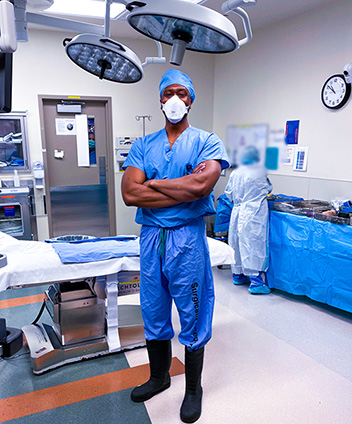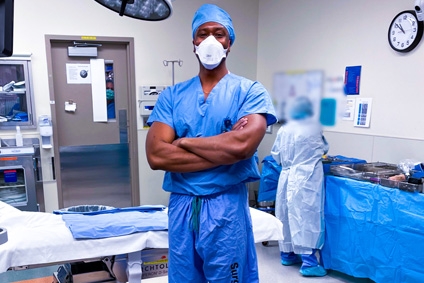
Of all the medical and surgical subspecialties, orthopedic surgery historically has had the lowest percentage of women and minorities. Mayo Clinic’s orthopedic surgery department is working to change that.
On the Mayo Clinic Q&A podcast, Dr. Okoroha, discusses his journey to becoming an orthopedic surgeon and his work as a mentor at Mayo Clinic.
Narrator 00:01
Coming up on Mayo Clinic Q&A,
Dr. Kelechi Okoroha 00:04
And as a minority, I always understood the fact that my road to becoming a surgeon would be a little bit more difficult than others.
Narrator 00:11
This summer Mayo Clinic's orthopedic surgery department and the Nth Dimensions internship program will introduce two female medical students to the field of orthopedic surgery. This internship offers a unique opportunity for women and minority students to gain valuable firsthand clinical and research experience.
Dr. Kelechi Okoroha 00:29
I think it's important to have more women, more people of color and diversity overall in orthopedic surgery for several reasons. Our population in America is very diverse. I think our patients deserve an equally diverse group of surgeons who are each equipped naturally with different cultural competencies to help treat them. Additionally, diversity in our surgeons will help decrease some of the inequalities we see in healthcare and treatment of patients today.
Deborah Balzer 00:56
Welcome to Mayo Clinic Q&A. I'm Deb Balzer sitting in for Dr. Halena Gazelka. Of all the medical and surgical subspecialties orthopedic surgery historically has had the lowest percentage of women and minorities. Mayo Clinic's orthopedic surgery department is working hard to change that. This summer two female medical students are participating in an eight-week clinical and research internship in orthopedic surgery in Rochester, Minnesota. The program was developed by Nth Dimensions, an organization that seeks to bring more women and minorities into the profession. With me today to discuss is Mayo Clinic orthopedic surgeon and graduate of Nth Dimensions, Dr. Kelechi Okoroha. Doctor, diversity, equity and inclusion are recognized as extremely important currently. Can you tell us a little bit about your journey, your story?
Dr. Kelechi Okoroha 01:59
Thanks for having me, Deb. Well, a little bit more about me, I'm the son of two Nigerian immigrants who migrated to America for better education opportunities. And so, I grew up playing basketball and loving sports, and then as my dreams and aspirations of playing in the NBA faded, I transitioned my love into wanting to become a great surgeon.
Deborah Balzer 02:18
Were there any obstacles doctor, related to your lack of equity in your journey to become a physician and an orthopedic surgeon?
Dr. Kelechi Okoroha 02:27
I attended two HBCUs for undergraduate and medical school in Xavier, University of Louisiana, and Howard Medical School. So, I was always aware of the differences in rates of minorities becoming physicians and surgeons. And as a minority, I always understood the fact that my road to becoming a surgeon would be a little bit more difficult than others, even more so because I didn't attend any Ivy League schools. But I think I was prepared for that.
Deborah Balzer 02:56
Doctor, why is important to have more women and people of color and diversity overall in orthopedic surgery?
Dr. Kelechi Okoroha 03:06
I think it's important to have more women, more people of color and diversity overall in orthopedic surgery for several reasons. I mean, our population in America is very diverse. And I think our patients deserve an equally diverse group of surgeons who are each equipped naturally with different cultural competencies to help treat them. Additionally, diversity in our surgeons will help decrease some of the inequalities you see in health care and treatment of patients today.
Deborah Balzer 03:34
Can you tell us more about what is Nth Dimensions? Can you explain what it is?
Dr. Kelechi Okoroha 03:40
Nth Dimensions is an organization that was founded by orthopedic surgeons with a goal of eliminating healthcare disparities for all communities. The program was initially founded in the field of orthopedics but has now expanded to other fields such as dermatology. And so, one of the major programs is a summer internship, which pairs underrepresented minorities, with established orthopedic surgeons over a summer of mentoring, research and professional development.
Deborah Balzer 04:07
What is its connection to Mayo Clinic orthopedics? How does that work?
Dr. Kelechi Okoroha 04:13
I guess you can say I was the connection for the program at Mayo Clinic. As a former Nth Dimensions scholar myself, I really remembered how beneficial the program was and all the relationships I was able to gain. And so therefore, I proposed that we implement it here at Mayo Clinic when I started.
Deborah Balzer 04:30
I'd love to hear a little bit more about your connections and your relationship. Tell me a little bit more about that when you were part of that program at Nth Dimensions. You had mentioned that you were the connection. Can you tell us a little bit more about that?
Dr. Kelechi Okoroha 04:46
The summer in between my first year and my second year of medical school at Howard University, I applied for the Nth Dimensions program as I was interested in orthopedics. And so, I was paired with another minority surgeon at Providence, and he really exposed me to orthopedic surgery, I got to see surgeries. I was involved in research projects, and I just developed a vast connection of other surgeons who were all helping me obtain my goal of becoming an orthopedic surgeon. And so, I thought that was really beneficial and something that I really treasured as a medical student.
Deborah Balzer 05:20
How does an effort like this program and this internship fit into do you think Mayo Clinic's overall goal for diversity, equity and inclusion?
Dr. Kelechi Okoroha 05:33
I think it fits in great as Mayo has made a real commitment to increase diversity in the institution. I mean, to my knowledge, I'm the first African American orthopedic consultant at the institution. So, that in itself is a huge step. And then also our diversity chair, Dr. Barlow is a huge diversity advocate and has already made great strides to increase diversity at the institution before I arrived. And so, he was right on board with the idea of Nth Dimensions and tried to push it through as quickly as possible.
Deborah Balzer 06:01
You're an alumnus and now a mentor of this Nth dimensions program. How does that experience as a participant influence your role as a mentor? How does that feel? How does that influence you?
Dr. Kelechi Okoroha 06:16
I think I have the unique experience to being on both sides of the coin. And so, now I'm really able to give back and pass down all that knowledge and guidance I was given in order to help others become successful.
Deborah Balzer 06:31
So, speaking of others, let's talk about what your mentees will be doing. So, they'll be here for eight weeks, what will they get to see and do here? What will their experience be like?
Dr. Kelechi Okoroha 06:42
Our mentees will get a great exposure to all aspects of orthopedics here. They'll gain clinical knowledge by being able to see patients in the clinic. They'll gain operative experience by being able to shadow surgeries. They'll gain research experience as they'll be the lead on a research paper, as well as other educational opportunities through conferences and clinical labs.
Deborah Balzer 07:03
What do you hope your mentees will take away from this experience doctor?
Dr. Kelechi Okoroha 07:09
Ultimately, I think we hope that this experience will reinforce our mentees' desires to become orthopedic surgeons. We also hope that they'll gain valuable knowledge and connections here while ultimately building their CV to become more competitive.
Deborah Balzer 07:23
Where would you like to see this program go next? I mean, if you were among the first here at Mayo Clinic, where would you like to see this grow, this program?
Dr. Kelechi Okoroha 07:34
I think we want this program to grow. And the fact that we start taking more Nth Dimensions scholars each year, and our overall goal is to increase diversity in institutions. So, what that looks like is recruiting more residents, and then ultimately recruiting more staff. And so, we kind of mimic our population as a whole.
Deborah Balzer 07:54
What would you recommend doctor, to people who are struggling to get an education due to diversity barriers? So, what would you recommend to those?
Dr. Kelechi Okoroha 08:10
t's tough, and it can be difficult. But I recommend never giving up. You know, we know as minorities, the path to becoming a physician is more difficult. And hopefully that changes here in the near future. But as the saying goes, where there's a will there's a way. And so, I think you have to find different methods to obtain the goals and seek out people who may have been in similar situations as you are and who are willing to help.
Deborah Balzer 08:34
Doctor, thank you for taking time. Congratulations to you. Looking forward to hearing about how your mentees do. Good luck on the program. And please won't you tell us your name and what you do here at Mayo Clinic.
Dr. Kelechi Okoroha 08:49
My name is Kelechi Okoroha, I'm a new orthopedic sports medicine consultant at the Mayo Clinic. I specialize in all sports medicine surgeries, hip arthroscopy, and shoulder arthroplasty. And I'm also one of the team physicians for the Minnesota Timberwolves.
Deborah Balzer 09:03
And what facility? Are you at the Mayo Clinic downtown Minnesota facility doctor?
Dr. Kelechi Okoroha 09:12
I see patients at Mayo Clinic Square in Minneapolis, but I also operate in Rochester.
Deborah Balzer 09:18
Very good. Thank you, doctor for taking time from your busy day to talk with us about diversity and inclusion in the program of Nth Dimensions. Good luck to you, and thanks so much for your time today. Our thanks to Mayo Clinic orthopedic surgeon, Dr. Kelechi Okoroha. Thanks for joining us.









